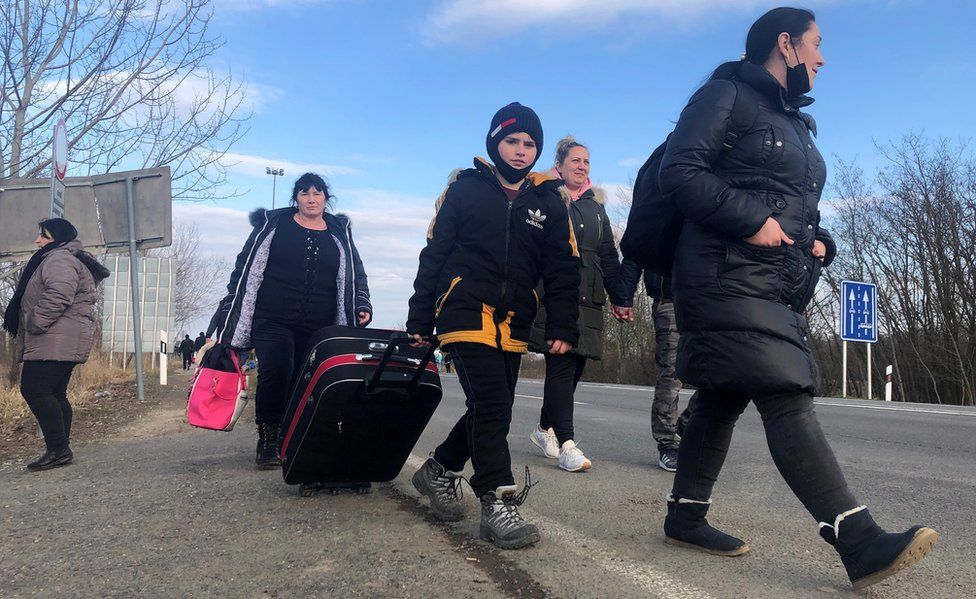Refugee agencies fear up to five million of Ukrainians could try to flee across the border as Russia’s war intensifies and casualties mount.
Tens of thousands of people have already crossed into five countries bordering western Ukraine.
Poland alone has reported more than 50,000 arrivals in two days, while thousands more have streamed further south into Moldova, Romania, Hungary and Slovakia.
Most of those fleeing the invasion are women and children, as all men aged 18 to 60 are being told to stay and fight. BBC correspondents met them at the borders.
‘Just pack our bags’
By Mark Lowen, BBC News,Poland
They arrived wheeling suitcases and clutching young children: a steady line of Ukrainians crossing the border here into Poland. According to Polish authorities 25,000 came today by early afternoon.
Among them was Nadia Slusarenko, who brought her two young children, leaving her eldest daughter back in Ukraine to help the army.
“Yesterday I woke up because I heard a noise and I asked my husband what was happening,” she told me. “He looked through the window and said, ‘Wow, Russians bombed our airport so just pack our bags and you have to save the kids’.”

Poland has in recent years been one of the EU’s most hardline anti-migrant members. But it also knows all too tragically the cost of Russian occupation and hostility, and is welcoming Ukrainians with open arms, building several reception centres.
There is traffic in the other direction, too. Mikolaj told me he was heading back to Ukraine to fight. “It’s our duty to go home to defend our country,” he said. “We didn’t do anything wrong to Russia. Putin is trying to capture the whole of Ukraine.”
‘We fear the Russians’
By Nick Thorpe, BBC News, Hungary
Those I met on the road told me they were running for their lives. Some have heard or seen explosions, others are just horrified by the prospect of war engulfing their whole country. Most are young or middle-aged. Only the elderly are staying behind to protect their homes.
“There’s a mood of panic in our village. People gathered in streets and set out for Hungary,” said Eva, 44, who got a ride with her two children to the border at Beregsurany from her village 12km (7.5 miles) away.
“We’re afraid the Russians will occupy the whole country. And we’re afraid our men will be conscripted.”
Most of those crossing the border are ethnic Hungarian Ukrainians, as this region of western Ukraine has a large Hungarian community.
At a small guest house not far from the border, Judit said her doorbell and phone had been ringing all night. She didn’t want to turn anyone away, but only had three rooms.
Vera and her granddaughter Maria told me they had driven almost non-stop, 1,300km (800 miles), all the way from Kharkiv in north-eastern Ukraine. When I asked if she had left family members behind, she buried her face in her arms. They are hoping to stay with friends in Poland.
A woman from the local village council served tea as small children clutched teddy bears. A minibus slowed down offering a ride to Budapest, three hours’ drive away.


‘We have to run’
By Lucy Williamson BBC News, Romanian border
Metres beyond the border post Valentina had stopped for breath by the side of the road, her Ukrainian number-plate telling a story of its own among the Romanian cars.
Having crossed two borders in the past 36 hours, first into Moldova then Romania, she was, as she put it, “still running”. Sitting behind her was her two-year-old son.
Moldova’s government says almost 16,000 people had crossed into the country by Friday, most of them Ukrainian.

“We left as soon as we heard the explosions on Thursday morning,” Valentina told me. “We said: ‘we have to run’.”
They drove out of Kyiv, glued to reports of the Russian invasion, with no clear destination in mind.
“There was news of bombs here, rockets there. There was nowhere to go,” she said. In the end, they drove straight to the Moldovan border – and kept driving.
As we crossed the Romanian border into Moldova there was a new kind of tension in the air.
“Weapons?” asked the border guard. I shook my head with a smile. “It’s no joke these days,” he sighed, before asking: “Do you have any information about what’s going on?”
Long wait at the border
By Rob Cameron, BBC News, Slovakia
At the Vysne Nemecke border crossing, about 2km from the Ukrainian city of Uzhhorod, a trickle of refugees made their way across the border. The same scene repeated itself every five minutes or so, usually a youngish woman pulling a child by the hand, a Slovak soldier or border guard helping to pull her suitcase.
Then a brief encounter with a waiting driver or relative to take them to who knows where: Slovakia, Hungary, the Czech Republic. No-one wanted to talk.
This is the largest crossing on Slovakia’s 100-km border with Ukraine.

The situation appears calm and under control, for now. But that is largely because cars are waiting eight hours to cross, apparently because Ukrainian border guards are checking that men of fighting age do not leave, and their Slovak counterparts are registering every arrival.
But as the fighting intensifies and more displaced people move westwards, the trickle is expected to increase in intensity.
Most here are women, the elderly or children. Some women are carrying very young children in their arms.
Slovak authorities say at least some have turned up with nowhere to go. Some are being accommodated in a local church. There are no reception centres erected yet.

Russia attacks Ukraine: More coverage
- LIVE: Latest updates from on the ground
- THE BASICS: Why is Putin invading Ukraine?
- VISUAL GUIDE: Tracking the invasion in maps
- FROM KYIV: Sheltering from rockets in basements
- FROM MOSCOW: Shock and support in Russian capital




























